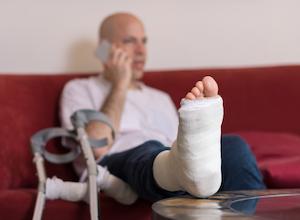RSD Injuries
NO FEES UNLESS WE ARE SUCCESSFUL

Reflex Sympathetic Dystrophy (RSD), also known as Complex Regional Pain Syndrome (CRPS), is a chronic pain condition that typically affects one limb following an injury or trauma. It can be a debilitating condition, causing severe pain and discomfort, which can impact a person’s ability to work and enjoy life.

For employees in Massachusetts, and many states with similar laws, who develop reflex sympathetic dystrophy as a result of a workplace injury, it’s essential to understand the workers’ compensation process, the benefits available to patients, and the importance of securing experienced legal representation from a firm like Bellotti Law Group, P.C.
Understanding Workers’ Compensation for RSD in Massachusetts
Workers’ compensation is a no-fault insurance system designed to provide benefits to employees who suffer work-related injuries or illnesses. In Massachusetts, RSD is recognized as a compensable condition under workers’ compensation laws, provided it can be established that the injury or illness arose out of and in the course of employment.
Workers’ Comp. Benefits for RSD injuries
Workers who develop RSD due to a work-related injury may be eligible for various benefits, including:

- Medical Benefits: Workers’ compensation covers all reasonable and necessary medical expenses related to the RSD diagnosis and treatment. This may include doctor visits, physical therapy, and occupational therapy, medication, and any other required treatment.
- Temporary Total Disability (TTD) Benefits: If an employee is unable to work due to RSD, they may receive TTD benefits, which typically amount to 60% of their average weekly wage, up to a state-mandated maximum. These benefits can be paid for up to 156 weeks.
- Permanent Partial Disability (PPD) Benefits: If RSD results in a permanent impairment, the worker may qualify for PPD benefits. The amount and duration of these benefits depend on the severity of the impairment and the employee’s pre-injury wages.
- Permanent Total Disability (PTD) Benefits: In cases where RSD leaves a worker completely and permanently disabled, they may be eligible for PTD benefits, which typically amount to two-thirds of their average weekly wage for the duration of their disability.
- Vocational Rehabilitation: Workers with RSD may require assistance to return to work or find suitable employment. Vocational rehabilitation services can help with job training, placement, and other necessary support.
The Workers’ Compensation Process for RSD Injuries
The Massachusetts workers’ compensation filing process for an RSD injury begins with promptly reporting the injury to your employer. Under state law, employees have up to four years to file a claim, but it is advisable to start the process as soon as possible.
Your employer is responsible for notifying their workers’ compensation insurance carrier, who will then file a First Report of Injury form (Form 101) with the Department of Industrial Accidents (DIA). If your claim is approved, benefits will commence, and medical treatment can be sought. In case of a dispute or denial, you may need to file a claim directly with the DIA using an Employee Claim Form (Form 110).
Throughout later stages of this process, it is crucial to maintain clear communication with your employer and your medical care providers, ensuring proper documentation of the injury and its connection to the workplace. Engaging an experienced workers’ compensation attorney, such as those at Bellotti Law Group, P.C., can be invaluable in navigating later stages of the filing process, handling disputes, and ensuring your rights are protected.
Workers’ Compensation Settlements for RSD Injuries

Workers’ compensation settlements for Reflex Sympathetic Dystrophy (RSD) injuries can vary widely based on the severity of the condition, the impact on the individual’s ability to work, and the specific circumstances surrounding each case.
In general, workers’ compensation settlements for RSD injuries aim to provide fair compensation for medical expenses, lost wages, and other benefits, such as vocational rehabilitation or disability payments.
There are two primary types of workers’ compensation settlements for RSD injuries:
Stipulation Agreement
In this type of settlement, both the injured worker and the insurance company agree on the benefits to be paid, including medical expenses and disability payments. The terms of the agreement are documented in a written stipulation, which is then submitted to the Department of Industrial Accidents (DIA) for approval. Once approved, the injured worker will receive the agreed-upon benefits according to the stipulation.
Lump-Sum Settlement
A lump-sum settlement involves a one-time payment from the insurance company to the injured worker, in exchange for releasing the insurer from any future claims related to the RSD injury. This type of settlement can be negotiated between the worker and the insurer, often with the help of an experienced workers’ compensation attorney. The lump-sum amount should take into consideration factors such as the worker’s future medical expenses, lost wages, and any potential disability benefits. Like stipulation agreements, lump-sum settlements must be approved by the DIA.

Determining the appropriate settlement for an RSD injury can be complex, as it requires a thorough understanding of the medical evidence, treatment costs, and the long-term impact on the individual’s ability to work. Hiring an experienced workers’ compensation attorney, such as those at Bellotti Law Group, P.C., can be crucial in negotiating a fair settlement and ensuring that the injured worker receives the compensation they deserve.
Workplace Injury Statistics in Massachusetts
While there are no specific statistics available exclusively for Reflex Sympathetic Dystrophy (RSD) injuries in Massachusetts, it is important to understand the broader context of workplace injuries and their affect on the prevalence of chronic pain conditions.
In Massachusetts, the Bureau of Labor Statistics (BLS) reported approximately 69,200 nonfatal workplace injuries and illnesses in 2019. This translates to an incidence rate of 3.1 cases per 100 full-time equivalent workers. Although these statistics encompass various types of injuries and illnesses, it is worth noting that RSD can develop following a range of workplace injuries, such as fractures, sprains, or even minor traumas.
RSD, also known as Complex Regional Pain Syndrome (CRPS), affects an estimated 5.5 to 26.2 people per 100,000 individuals in the United States. The condition is characterized by severe, chronic pain that typically affects the extremities of one limb following an injury or trauma. While these national prevalence rates may not be specific to Massachusetts, they provide an insight into the potential impact of RSD on the overall workforce.
Potential Causes of an RSD Injury
Complex Regional Pain Syndrome (CRPS) and Reflex Sympathetic Dystrophy (RSD) are terms used interchangeably to describe a chronic pain condition that typically affects one limb following an injury or trauma.
The sympathetic nervous system plays a significant role in the development and progression of Reflex Sympathetic Dystrophy Syndrome (RSD) injuries or Complex Regional Pain Syndrome (CRPS). As a part of the autonomic nervous system, the sympathetic nervous system regulates involuntary functions, such as blood flow, heart rate, and the body’s response to stress or injury. In the case of RSD, it is believed that the sympathetic nervous system may become overactive or dysfunctional following an injury or trauma.
This abnormal response to pain can lead to increased sensitivity and excitation of the nerves, resulting in persistent pain, inflammation, and other symptoms, such as swelling, changes in skin temperature, and altered hair and nail growth in the affected limb. Although the exact mechanisms underlying the sympathetic nervous system’s role in RSD remain unclear, its involvement in the condition highlights the complexity of RSD and the importance of comprehensive medical and therapeutic interventions to manage and alleviate symptoms.
The condition typically arises following an injury or trauma, which can be relatively minor, such as a sprain, or more severe, like a fracture or surgery.
The exact cause of RSD remains unclear; however, researchers believe it may involve an abnormal response of the nervous system to the initial injury.

This response could include heightened sensitivity and overactivity of the nerves, leading to persistent pain, swelling and inflammation in the affected limb. Additional factors that may contribute to the development of RSD include genetic predisposition, psychological factors, and immune system dysfunction. It is important for doctors to note that not all individuals who experience similar injuries will develop Reflex Sympathetic Dystrophy Syndrome (RSD), and the condition’s onset and progression can vary significantly between individuals.
How a Workers’ Compensation Lawyer Can Help
Navigating the workers’ compensation system can be complex and challenging, especially if you are dealing with a rare condition like RSD. Insurance companies may dispute your claim, and the process of getting the benefits you need can be overwhelming. That’s where Bellotti Law Group, P.C. can help.
Hiring a workers’ compensation attorney at Bellotti Law Group, P.C. can provide invaluable protection for individuals with RSD injuries navigating the complex claims process, especially when dealing with insurance companies. Insurance providers often prioritize minimizing their financial liability and may attempt to deny, delay, or reduce the benefits owed to injured workers. An experienced attorney from Bellotti Law Group, P.C. understands the tactics employed by insurance companies and can effectively advocate for your rights, ensuring you receive the compensation you deserve.
Their skilled legal team will guide you through the entire process, from gathering and presenting medical evidence to substantiating your RSD diagnosis, to negotiating with insurance adjusters, and representing you in hearings and appeals if necessary. By enlisting the support of a workers’ compensation attorney at Bellotti Law Group, P.C., you can focus on your recovery while having peace of mind that your claim is in capable hands.
Our experienced workers’ compensation lawyers can help you with your RSD workers’ compensation claim by:
Gathering evidence
We will work with medical professionals, doctors and other experts to gather evidence showing that your RSD diagnosis was caused by a work-related injury.
Filing your claim
We will help you file your workers’ compensation claim and ensure that all necessary paperwork is submitted correctly and on time.
Negotiating with insurance companies
We will handle all communications with the insurance company, including negotiating for a fair settlement.
Representing you in court
If your case goes to court, we will provide skilled representation to help you get the benefits you deserve.
Contact Us Today
Reflex Sympathetic Dystrophy (RSD) injuries, associated with workers’ compensation claims, are complex and often difficult to manage. RSD, also known as Complex Regional Pain Syndrome (CRPS), affects blood flow, blood vessels, and the spinal cord, leading to a range of symptoms that include burning pain, swelling, and changes in skin color and temperature. In some cases, surgical procedures, such as nerve blocks or spinal cord stimulation, may be required to reduce symptoms and improve the injured worker’s quality of life.
Workers’ compensation benefits play a crucial role in covering medical expenses related to RSD, including diagnostic tests, treatment modalities, and ongoing care. It is essential for individuals with RSD injuries to understand their rights under workers’ compensation laws and seek appropriate legal representation to ensure they receive the compensation they deserve for their injury and the necessary treatments to alleviate their symptoms.
If you are suffering from reflex sympathetic dystrophy as a result of a work-related injury, you don’t have to navigate the workers’ compensation system alone. At Bellotti Law Group, P.C., our workers’ compensation lawyers are here to help. Contact us today to schedule a free consultation and learn more about how we can assist you in getting the benefits you need to manage your RSD.

